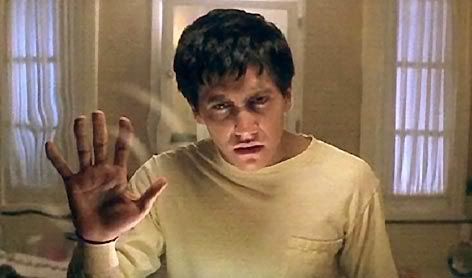
frosty the snowwoman
I recently watched the recent film Narnia. I saw it with two other adults, and that inimitable four-year-old, Courtney, who'd seen the film countless times, in the modern way of kiddie [and teen] DVD viewers, and who insisted on giving a running commentary [a rather more amusing one than what's often offered as a DVD extra], though there were certain 'scary-hairy' bits, such as the sacrifice of the lion, which she couldn't bear to watch.
Considering my focus on religion and particularly Christianity in recent times, this might be described as a must-see for me, but I wasn't hugely looking forward to it. The fact was, I didn't want to look at it in a critical, kill-joy way, but at the same time I was reluctant to swallow any didactic message – though I strongly suspected that, if there was any underlying Christian propaganda, the film version of C S Lewis's book, which I've never read, would dilute it considerably.
I also would've liked something impossible – to see the film through the eyes of a child. I've occasionally mentioned a text I read at the age of ten or eleven, a prose version of Spenser's Tales from the faerie queene. It set my imagination alight, and I fell in love with the fair Britomartis, a maiden who donned armour and fought various wicked foes and fiends on her way to rescuing her father from the Black Knight's tower [if I remember aright].
Though I can't remember being struck by any Christian message in Spenser, it's surely true that the simple goodies v baddies format would've appealed to me, as it would to any child of my age, or younger. By the time I came to read Lord of the Rings however [and I never finished it], the goodies v baddies approach would've struck me as quite shallow. After all, by that time I'd read all the major fictions of Kafka and Dostoyevski, as well as substantial portions of the philosophy of Nietszche and Schopenhauer, and I didn't see too many of their preoccupations reflected in the concerns of Bilbo Baggins or any of the inhabitants of Middle-Earth. In fact though, what ultimately put me off finishing Lord of the Rings was the role of women. They all seemed to me uniformly pathetic. It was a macho, marshal world, and positively medieval, not a world I hankered after at all.
I know that Tolkien and C S Lewis were of the same circle, that they were both committed Christians, but that they were at odds about how they were to portray what they saw as Christian values in their works, with Lewis favouring a more didactic approach. I've had Lewis pressed upon me by at least one Christian as an interesting writer/thinker. I've also read at least one critic who dismissed him as misogynistic, bigoted and generally nasty. The Screwtape Letters, I believe, set out his ideas fairly clearly. I've not read any of his writings, beyond a few quotes here and there, so can't comment on how well or poorly the film captures the Christian values he wanted to promote, but by the time I've finished this slow review, I might have familiarised myself with at least the general trend of his ideas.
It's a goodies and baddies film, and a magical one, so its appeal for children is obvious.
Like the film Bedknobs and Broomsticks, which was set at the time of the London blitz in the forties, The lion the witch and the wardrobe starts with the evacuation of kids to protect them from the ravages of war and the largely incomprehensible dangers it presents. The transfer from familiar surroundings to the unfamiliar world of 'the provinces' – is used as a springboard to a kind of radical, but very understandable, escapist fantasy, in which the children are much more empowered. There are some clear elements of Christian symbolism, with much talk of prophecy and the return of a powerful lord or king, Aslan, to restore the blighted – but still quite attractive - world of Narnia to its former glory. Other important themes include the concept of betrayal and the importance of family. There's a resurrection story, as well as a goodies and baddies theme, with much emphasis on good old-fashioned valour and honour. As with The Lord of the Rings, human psychology, in any sophisticated sense, is almost entirely absent, and character development isn't much of an issue. In this respect, it reflects very much a child's perspective. The world of Narnia, like that of Middle-Earth, is positively medieval [Tolkien described his invented world as pre-Christian, though extolling Christian values], and has a weird nostalgic element, being, as any serious historian would admit, grossly unrepresentative of the reality of earlier times.
Of course it's fantasy, but the question is whether it's a fantasy worth having or a retreat into childhood certainties, certainties that never were real, but which seem to represent a preliminary or interim understanding of the world.
Lucy, the youngest of four evacuated siblings, stumbles upon the snow-laden Narnia when she hides in an imposing wardrobe during a game of hide-and-seek in the country house of a professor, where they've come to stay. Like Doctor Who's Tardis, this wardrobe is much more than the sum of its parts. It serves as the entrance to a world of snow-laden trees and odd creatures, one of whom she soon encounters. His name is Tumnus, and he's a faun. Association: friendly, gentle, timid – and that's how he comes across. The first overt religious note is struck here – he wonders aloud if Lucy isn't one of 'Eve's daughters'. Unfortunately the little one doesn't have the presence of mind to retort – 'no I'm actually more closely related to my friends the chimpanzees than to Eve', so we, or rather the kids, have to keep swallowing this 'sons of Adam, daughters of Eve' swill throughout the film.
Why is this stuff actually in the film? The film-makers would no doubt say it was put in or kept in to acknowledge the Christian spirit of author Lewis, without ramming it too much down the kids' throat. A mild dose of Christian mythology, perfectly harmless.
Unfortunately not. I don't know if Lewis really believed we were all descended from Adam and Eve, but I'm sure we've all met people who fervently believe this to be true – and allow this 'truth' to deeply affect their perspective on the world. This is a living issue in our culture and not just harmless mythology [for example I've known someone, a reasonably liberal Catholic, use the Adam and Eve story to argue for the unnaturalness and ungodliness of homosexuality]. Any lively, intelligent child will wonder soon enough what this 'sons of Adam, daughters of Eve' stuff means, more or less inviting adults to tell them the glorious story of our origins. That's no doubt what Lewis intended. There's an insidiousness here that's world away from Harry Potter.
Lucy accepts Tumnus's invitation to take tea and cakes and sardines at his home. We notice that he's behaving a little suspiciously, and we soon discover why. Under pressure from a witch who has styled herself the Queen of Narnia, he plans to kidnap Lucy, because she's a human. He tearfully tells her this after a strange incident in which his home fire waxes more and more frenetic and finally roars like a lion, a sign and portent which causes Lucy to faint. After his revelation, the remorseful Tumnus helps Lucy to escape back to the wardrobe and the real world. There she tells the story to her siblings, who of course don't believe her.
Shortly thereafter, Lucy returns to the magic wardrobe. The second youngest, Edmund, spies her and follows her into Narnia, where he's picked up by the aforesaid witch-queen, played with great presence by Tilda Swinton, who does as well as she can with the one-dimensionality of the role [basically she's Satan, and you can't get much more one-dimensional than that].
Edmund, very much the mopey outsider, is 'befriended' by the frosty witch-queen, though not before her attendant, Ginarrbrik, threatens to send him to 'the hereafter', our second religious reference. Edmund lets slip that Tumnus has met and released Lucy, and that he has two other siblings. The witch feeds him with magic delights, and flatters him, hoping to lure all four children into her clutches.
After she leaves him, Edmund catches up with Lucy, from whom he learns that Tumnus is living in fear of the white witch. They return to the real world, where Edmund refuses to corroborate Lucy's story of her second visit to Narnia. Lucy runs off, inadvertently into the arms of 'the professor', the owner of the country estate these well-off kids have been sent to. The professor mixes benevolence with authority, providing Lucy with hot chocolate, and the two older siblings with a stern lecture about acting like a proper family.
The professor takes Lucy's side, believing, or acting as if he believes, her story. He waves away the older sister's remark that it's illogical to find another world in a wardrobe, questioning the strange things kids are taught in schools these days.
This is a key remark, and thereafter the term 'logical' is used with clunky irony several times in the film [contrasted with imagination, as if these are two opposite concepts]. In order to fully understand this, we have to realize that for Lewis, logic was somehow inextricably linked with science which he, rightly I think, saw as posing a threat to religion, but also a threat to morality, because he saw science as mechanistic and reductionist. Inevitably, he saw scientists as logic-obsessed unimaginative drones, killjoys of the human spirit. A sympathetic intro to Lewis's thoughts on science and its promulgation through the education system can be found here. I'm far from being so sympathetic, as I've always found science to be much more of a stimulus to the imagination than a dampener of it, and a thousand illustrations can be offered, reflections on the nature of time, of space, the universe, the origins of the human, the origins of consciousness, the endless ways different species interconnect, vie with each other, feed off and on each other, and so on and on. The metaphysical thinking that Lewis fears will be or has been struck down by modern science is not something that will be missed by the scientifically minded, because scientific thinking offers something far richer and more exciting, and more grounded, and more effective. Astrology, after all, has been believed in for many thousands of years, to no effect whatsoever – apart from the effect on those individual minds that succumb to it. Religion generally can be described in much the same way.
Labels: film, the faith hope






















